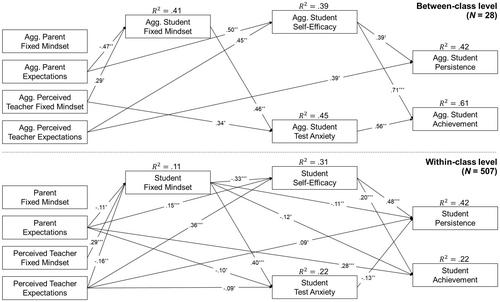Social antecedents of children's mindsets, motivation and achievement in math: Investigating parental beliefs and perceived teacher beliefs
Abstract
Background
As children mature, they tend to develop a fixed mindset in math, which has been identified as a contributor to declining confidence and widespread anxiety in math. Both parents and teachers can function as critical socializers in shaping children’s fixed mindsets.
Aims
Given that children's beliefs are formed through interactions with socializers, we tested our hypothesis that the mindsets and expectations of parents and those of teachers perceived by students would predict the children's mindsets, motivation and achievement in math. We further posited that these social influences would indirectly shape students' self-efficacy and test anxiety through students' mindsets, ultimately predicting their persistence and achievement in math.
Sample and Methods
Using multilevel path analyses, we analysed the data from 507 third- and fourth-graders in 28 classrooms and their parents in Korea.
Results
Among the self-reported parental measures, only parental expectations for their child’s success in math were a significant negative predictor of students’ fixed mindsets in math at the within-class level. Student perceptions of their teacher’s fixed mindsets and expectations were, respectively, a positive and a negative predictor of students’ fixed mindsets. Students’ fixed mindsets, in turn, positively predicted their math test anxiety and negatively predicted their math self-efficacy, persistence, and achievement. Patterns observed at the between-class level were generally consistent with those at the within-class level.
Conclusions
This study found meaningful associations of self-reported parental beliefs and student-perceived teacher beliefs with student mindsets, motivation, and achievement in math. Longitudinal or experimental research is needed to clarify their causal relationships.





 求助内容:
求助内容: 应助结果提醒方式:
应助结果提醒方式:


